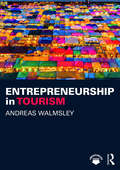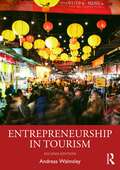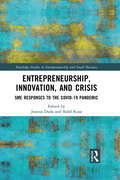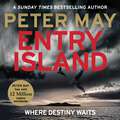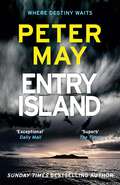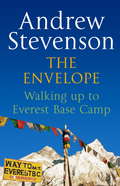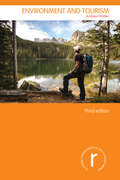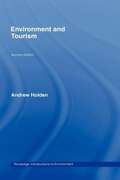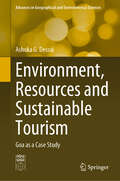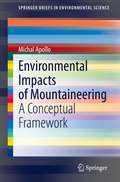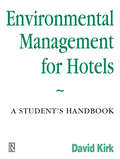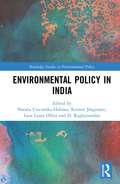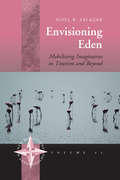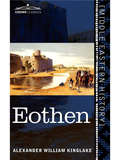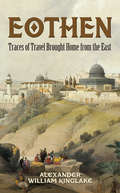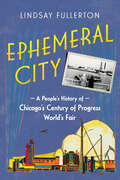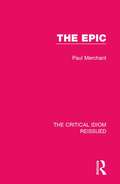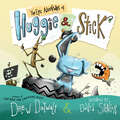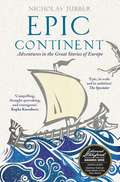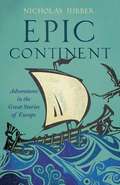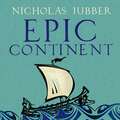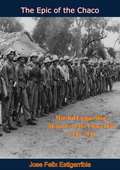- Table View
- List View
Entrepreneurship in Tourism
by Andreas WalmsleyThe development of tourism has historically been characterised by enterprising individuals. Small businesses are the backbone of the tourism and hospitality industry. However, entrepreneurship and the entrepreneurial process have long been marginal topics within tourism scholarship. This is a critical, yet accessible, introduction to the subject. Structured into twelve chapters, this book takes an intuitive step-by-step progression through entrepreneurship in tourism: context, theoretical perspectives and definitions; the entrepreneurial process from concept to reality to growth, policy context and future directions. Featuring learning outcomes, ‘reflective practice’ activities and a range of international case studies that encourage critical thinking and practical applications, this is essential reading for anyone studying tourism degree programmes at undergraduate and graduate level.
Entrepreneurship in Tourism
by Andreas WalmsleyThis timely and innovative book is a theoretically underpinned yet accessible introduction to entrepreneurship in tourism.The volume takes an intuitive step-by-step approach through entrepreneurship in tourism: it begins with a review of key concepts in entrepreneurship and applies these to tourism; it then tackles the practical elements of the entrepreneurial process in tourism as well as firm growth with a specific focus on entrepreneurial marketing. The final chapters of the book take a more macro perspective at reviewing the place of entrepreneurship in society and how context shapes entrepreneurship in tourism.This second edition has been fully updated to include: A wider restructure of the original text, including the addition of chapters on the context of tourism, the addition of sustainable tourism entrepreneurship in a chapter on social and sustainable tourism entrepreneurship, alongside a chapter on the role of tourism in offering a pathway to empowerment New content covering key developments in entrepreneurship, including important topics that are only beginning to find their way into tourism literature. This includes themes such as: business models and business model innovation, crowdfunding in tourism, the role of AI and digitalisation in tourism marketing, sustainable tourism entrepreneurship, tourism entrepreneurial ecosystems, and the role of tourism entrepreneurship in supporting empowerment and poverty alleviation. These novel themes co-exist alongside material from the first edition that remains under-researched such as how tourism firms may maintain an entrepreneurial orientation and innovations in tourism employment Updated global case studies and examples from industry and academia throughout Each chapter offers an abstract, learning outcomes and a series of questions to stimulate critical engagement with the material covered. As such, the text offers an invaluable resource to tutors and their students on both undergraduate and postgraduate programmes in tourism, as well as tourism scholars engaging with the dynamic phenomenon of entrepreneurship in tourism.
Entrepreneurship, Innovation, and Crisis: SME Responses to the COVID-19 Pandemic (Routledge Studies in Entrepreneurship and Small Business)
by Joanna DudaEntrepreneurship, Innovation, and Crisis: SME Responses to the COVID-19 Pandemic aims to address the conditions for the operations of SMEs during the time of the COVID-19 pandemic as well as the governmental support for entrepreneurs in such industries as tourism, manufacturing, recycling, education, and printing as well as the creative industry. Through the presentation of various strategies for the functioning and development of companies under crisis conditions along with new management approaches for coping with them, this book discusses the conditions for the operations of SMEs during the time of the COVID-19 pandemic as well as the support for entrepreneurs that has been offered by the governments of different countries. This approach will allow our results to be useful for a wide audience – making it especially valuable to researchers, academics, policymakers, and advanced students who are interested in crises, entrepreneurship, small and medium-sized enterprises, and strategic management.
Entry Island: An edge-of-your-seat thriller you won't forget
by Peter MayWINNER: DEANSTON SCOTTISH CRIME BOOK OF THE YEAR 2014WINNER: ITV SPECSAVERS CRIME THRILLER BOOK CLUB BEST READ OF THE YEAR 2014'A wonderfully complex book' PETER JAMESA detective is haunted by the feeling he knows his murder suspect - despite the fact they have never met.IF YOU FLEE FATE... When Detective Sime Mackenzie is sent from Montreal to investigate a murder on the remote Entry Island, 850 miles from the Canadian mainland, he leaves behind him a life of sleeplessness and regret. FATE WILL FIND YOU... But what had initially seemed an open-and-shut case takes on a disturbing dimension when he meets the prime suspect, the victim's wife, and is convinced that he knows her - even though they have never met. And when his insomnia becomes punctuated by dreams of a distant Scottish past in another century, this murder in the Gulf of St. Lawrence leads him down a path he could never have foreseen, forcing him to face a conflict between his professional duty and his personal destiny.LOVED ENTRY ISLAND? Read the first book in Peter May's acclaimed China thrillers series, THE FIREMAKERLOVE PETER MAY? Buy his new thriller, A SILENT DEATH(P)2013 Quercus Publishing Ltd
Entry Island: An edge-of-your-seat thriller you won't forget
by Peter MayTHE 12 MILLION COPY BESTSELLING AUTHOR OF THE LEWIS TRILOGY'Peter May is one of the most accomplished novelists writing today' Undiscovered Scotland'No one can create a more eloquently written suspense novel than Peter May' New York Journal of BooksA detective is haunted by the feeling he knows his murder suspect - despite the fact they have never met.When Detective Sime Mackenzie is sent from Montreal to investigate a murder on the remote Entry Island, 850 miles from the Canadian mainland, he leaves behind him a life of sleeplessness and regret.But what had initially seemed an open-and-shut case takes on a disturbing dimension when he meets the prime suspect, the victim's wife, and is convinced that he knows her - even though they have never met.And when his insomnia becomes punctuated by dreams of a distant Scottish past in another century, this murder in the Gulf of St. Lawrence leads him down a path he could never have foreseen, forcing him to face a conflict between his professional duty and his personal destiny.LOVED ENTRY ISLAND? Buy his new thriller, The Black Loch
Entry Island: An edge-of-your-seat thriller you won't forget
by Peter MayTHE 12 MILLION COPY BESTSELLING AUTHOR OF THE LEWIS TRILOGY'Peter May is one of the most accomplished novelists writing today' Undiscovered Scotland'No one can create a more eloquently written suspense novel than Peter May' New York Journal of BooksA detective is haunted by the feeling he knows his murder suspect - despite the fact they have never met.When Detective Sime Mackenzie is sent from Montreal to investigate a murder on the remote Entry Island, 850 miles from the Canadian mainland, he leaves behind him a life of sleeplessness and regret.But what had initially seemed an open-and-shut case takes on a disturbing dimension when he meets the prime suspect, the victim's wife, and is convinced that he knows her - even though they have never met.And when his insomnia becomes punctuated by dreams of a distant Scottish past in another century, this murder in the Gulf of St. Lawrence leads him down a path he could never have foreseen, forcing him to face a conflict between his professional duty and his personal destiny.LOVED ENTRY ISLAND? Buy his new thriller, The Black Loch
The Envelope: Walking up to Everest Base Camp
by Andrew StevensonTwelve years after his classic travel narrative Annapurna Circuit Andrew Stevenson returns alone once again to the Himalayas on a deeply personal quest, a journey both corporal and spiritual. Narrowly escaping paralysis after shattering his spine in a motorbike accident weeks after his younger brother's untimely death, Stevenson's hike up to Everest Base Camp is as much introspective passage of healing as intriguing depiction of his fellow backpackers and the Sherpa people. Lying in a hospital bed in a morphine-induced state of hallucination after his accident, Stevenson promises himself to go back to the Himalayas, to heal. Five months after his mishap, and against all the odds, this recuperative solitary climb into high mountain valleys provides a spectacular backdrop to an emotional acknowledgment and acceptance of a lost sibling. Interlaced with the hardships of pushing to the edge of personal physical endurance and beyond, The Envelope: Walking up to Everest Base Camp is a richly rewarding read on every level.
The Envelope: Walking up to Everest Base Camp
by Andrew StevensonTwelve years after his classic travel narrative Annapurna Circuit Andrew Stevenson returns alone once again to the Himalayas on a deeply personal quest, a journey both corporal and spiritual. Narrowly escaping paralysis after shattering his spine in a motorbike accident weeks after his younger brother's untimely death, Stevenson's hike up to Everest Base Camp is as much introspective passage of healing as intriguing depiction of his fellow backpackers and the Sherpa people. Lying in a hospital bed in a morphine-induced state of hallucination after his accident, Stevenson promises himself to go back to the Himalayas, to heal. Five months after his mishap, and against all the odds, this recuperative solitary climb into high mountain valleys provides a spectacular backdrop to an emotional acknowledgment and acceptance of a lost sibling. Interlaced with the hardships of pushing to the edge of personal physical endurance and beyond, The Envelope: Walking up to Everest Base Camp is a richly rewarding read on every level.
Environment and Tourism (Routledge Introductions to Environment: Environment and Society Texts)
by Andrew HoldenThe global demand for tourism continues to increase as economic growth creates opportunities for its consumption as a lifestyle option across cultures. The spatial reach of recreational tourism into remoter environments reflects a desire to reconnect to nature that is partially created by the global trend toward urbanisation. At the same time, anthropogenic created environmental problems have led us to re-evaluate our relationship to nature and the values that are held by the environment. This third edition ofEnvironment and Tourism incorporates additional material on environmental philosophies and ontologies of nature and how these influence our understanding of tourism's relationship with the natural environment. In an epoch representing a critical juncture for the future well-being of the planet based on our relationship to nature, the text has been updated to reflect the growth in significance of the interaction between tourism and the natural environment as a part of this discourse. It communicates a range of key conceptual debates on the ethics and economics of the consuming nature for tourism and relates these to real world examples whilst evaluating environmental planning, and management responses. The book seeks to highlight the relevance of the significance of tourism for nature within the framework of society, as a system of inter-connected places across space and time, exploring the relationship of the environments of where tourists come from with the ones that they travel to. The updated features include: new chapters on philosophies and constructs of the environment, environmental ethics, and tourist consumption an extensive range of international case studies used to illustrate the theoretical ideas presented boxes offering bite sized insights, and think points designed to encourage students to further engage with the topics discussed Environment and Tourismemphasises a holistic view of the tourism system and how it interacts with nature, illustrating the positive and negative effects of this relationship. It emphasises how ontologies of the environment influence the planning and management of tourism for natural resource conservation and human development. It is an invaluable tool for anyone studying Human Geography, Tourism and Environmental Studies, as well as for policy makers and consultants working in the field of tourism development.
Environment and Tourism (2nd Edition)
by Andrew HoldenThis second edition of Environment and Tourism reflects changes in the relationship between tourism, society and the natural environment in the first decade of the new century. Alongside the updating of all statistics, environmental policy initiatives, examples and case studies new material has been added. This includes two new chapters: one on climate change and natural disasters and the other on the relationship between tourism and poverty. These themes have direct relevance, not only to tourism, but are reflective of the wider relationship between nature and society, a thesis that contextualizes this book. Tourism is also analyzed as an interconnected system, linking the environments of where tourists come from, with the ones they go to. Taking a holistic view of the tourism system and how it interacts with the natural environment, this volume illustrates the positive and negative effects of this relationship, and importantly how tourism can be planned and managed to encourage natural resource conservation and aid human development. It is an invaluable tool for all those studying human geography, tourism and environment studies.
Environment, Resources and Sustainable Tourism: Goa as a Case Study (Advances in Geographical and Environmental Sciences)
by Ashoka G. DessaiThis book suggests sustainable economy from the viewpoint of tourism fostering low carbon footprint. Focussed on conserving heritage, culture and endemic biota of a crucial biodiversity hotspot of the world, the book discusses the impact of a large population, fast-paced development and excessive consumption of earth resources by tourism in a developing economy. The book (i) assesses the impact of overexploitation of earth resources on environmental components such as air, water, land and people, (ii) examines the sustainability of tourism on the physical, economic and socio-cultural environment including human lifestyles, (iii) presents the potential of tourism in promoting sustainable development, poverty alleviation and conservation of nature and (iv) formulates recommendations for tourism, fostering sustainable development in Goa, India. The book offers students, researchers, academics and professionals a comprehensive discourse integrating geological and societal perspectives on core issues. It generates critical thinking on the complex issue of sustainable tourism by providing in-depth perspective on peoples of different hues and their role in safeguarding the future of this unique region.
Environmental Impacts of Mountaineering: A Conceptual Framework (SpringerBriefs in Environmental Science)
by Michal ApolloThis book investigates the consequences of mountaineering (hiking, trekking, climbing) on the natural environment. These consequences are divided into three groups: 1) transformations caused by the mountaineer’s, or other people’s, stay in a mountaineering region; 2) transformations caused by the mountaineer’s travel (movement) through a mountaineering region, with the consideration of the ground type (rock, rock and grass, grass, residual soil, snow, ice), and 3) transformations caused by the use of mountaineering equipment. Each of the three groups are examined individually for their direct interference with the environment, i.e. caused by the main activities of climbing, trekking and hiking (both for elite and mass mountaineering) and their indirect interference caused by auxiliary activity (mainly in the case of mass mountaineering). Auxiliary activity includes guide services, transport of equipment, use of base camp facilities and the delivery of artificial support equipment, and supports the main activity. The consequences of mountaineering on the natural environment are characterized in terms of individual components of the environment (land relief, soil, vegetation, fauna, and landscape) and location/zone of mountaineering activity (hiking, trekking or climbing zone). Because of the connections and interdependence between particular components of the environment (biotic and abiotic), only preservation of each of them can bring the desired effect – a reduction in the negative impact of mountaineering. This book presents comprehensive research outcomes and serves as a platform for more detailed, future studies.
Environmental Management for Hotels
by David KirkEnvironmental Management for Hotels is a textbook for hospitality students that covers the relatively new field of environmental management. The reader is guided in how to make decisions which allow hotels to obtain optimum benefits for the environment whilst not threatening their own financial viability. Students are given an understanding of both the concepts and practical implications of environmental challenges relating to hotels. The case study material incorporated ties in theory with real life, and provides an international context. The text emphasizes supervisory issues which relate to the management of hospitality operations in ways which are sensitive to the impact on the environment. The main areas of environmental management featured are: *water *energy *the indoor environment *materials and waste.
Environmental Policy in India (Routledge Studies in Environmental Policy)
by Natalia Ciecierska-Holmes Kirsten Jörgensen Lana Laura Ollier D. RaghunandanThis book systematically introduces historical trajectories and dynamics of environmental policy and governance in India. Following the features of environmental policy in India as outlined in Chapter 1, subsequent chapters explore domestic and international factors that shape environmental policy in the country. The chapters examine the interplay between governmental and non-governmental actors, and the influence of social mobilisation and institutions on environmental policy and governance. Analysing various policy trajectories, the chapters identify and explore five central environmental policy subsystems: forests, water, climate, energy and city development. The authors drill down into the social, economic, political and ecological dimensions of each system, shedding light on why striking a balance between national economic growth and environmental sustainability is so challenging. Drawing on political science theories of policy processes and related theoretical concepts, this innovative edited volume will be of great interest to students and scholars of environmental policy and politics and South Asian studies more broadly.
Envisioning Eden: Mobilizing Imaginaries in Tourism and Beyond (New Directions in Anthropology #31)
by Noel B. SalazarAs tourism service standards become more homogeneous, travel destinations worldwide are conforming yet still trying to maintain, or even increase, their distinctiveness. Based on more than two years of fieldwork in Yogyakarta, Indonesia and Arusha, Tanzania, this book offers an in-depth investigation of the local-to-global dynamics of contemporary tourism. Each destination offers examples that illustrate how tour guide narratives and practices are informed by widely circulating imaginaries of the past as well as personal imaginings of the future.
Envisioning New Jersey: An Illustrated History of the Garden State
by Richard F. Veit Maxine N. LurieSee New Jersey history as you read about it! Envisioning New Jersey brings together 650 spectacular images that illuminate the course of the state's history, from prehistoric times to the present. Readers may think they know New Jersey's history--the state's increasing diversity, industrialization, and suburbanization--but the visual record presented here dramatically deepens and enriches that knowledge. Maxine N. Lurie and Richard F. Veit, two leading authorities on New Jersey history, present a smorgasbord of informative pictures, ranging from paintings and photographs to documents and maps. Portraits of George Washington and Molly Pitcher from the Revolution, battle flags from the War of 1812 and the Civil War, women air raid wardens patrolling the streets of Newark during World War II, the Vietnam War Memorial--all show New Jerseyans fighting for liberty. There are also pictures of Thomas Mundy Peterson, the first African American to vote after passage of the Fifteenth Amendment; Paul Robeson marching for civil rights; university students protesting in the 1960s; and Martin Luther King speaking at Monmouth University. The authors highlight the ethnic and religious variety of New Jersey inhabitants with images that range from Native American arrowheads and fishing implements, to Dutch and German buildings, early African American churches and leaders, and modern Catholic and Hindu houses of worship. Here, too, are the great New Jersey innovators from Thomas Edison to the Bell Labs scientists who worked on transistors. Compiled by the authors of New Jersey: A History of the Garden State, this volume is intended as an illustrated companion to that earlier volume. Envisioning New Jersey also stands on its own because essays synthesizing each era accompany the illustrations. A fascinating gold mine of images from the state's past, Envisioning New Jersey is the first illustrated book on the Garden State that covers its complete history, capturing the amazing transformation of New Jersey over time.View sample pages (http://issuu.com/rutgersuniversitypress/docs/lurie_veit_envisioning_sample)Thanks to the New Jersey Historical Commission, the New Jersey Council for the Humanities, and generous individual donors for making this project possible.
EOTHEN: Traces of Travel Brought Home from the East
by Alexander William KinglakeThis is an extraordinary work of travel writing that is more about the author's personal exploration than it is about monuments and museums. Inspired by a journey with an Eton colleague ten years prior, this memoir exemplifies how travel can become a personal experience and change who we are. Though over a century and half old, Eothen, Traces of Travel Brought Home from the East feels as strikingly modern as any contemporary literary memoir. Kinglake's intimate, conversational style and his sense of humor and irony made Eothen-meaning "from the early dawn" or "from the East"-an instant success when it was first published in 1844. Even today, in the 21st century, it maintains its fresh and original feel. For lovers of travel, the Middle East, or self discovery this book will become an instant favorite.
Eothen: Traces of Travel Brought Home from the East
by Alexander William Kinglake"My favorite travel book. Sparkling, ironic, and terrific fun." -- Jan MorrisEothen ("From the East") recaptures a bold young Englishman's exploits in the Middle East during the 1830s. Alexander William Kinglake recounts his rambles through the Balkans, Turkey, Cyprus, Syria, Palestine, and Egypt in a style radically different from other travel books of his era. Rather than dwelling on art or monuments, Kinglake's captivating narrative focuses on the natives and their cities. His adventures - populated by Bedouins, pashas, slave-traders, monks, pilgrims, and other colorfully drawn personalities - include crossing the desolate Sinai with a four-camel caravan and a sojourn in plague-ridden Cairo. A contemporary of Gladstone at Eton and of Tennyson and Thackeray at Cambridge, Kinglake offers a frankly imperialistic worldview. "As I felt so have I written," he declares in his preface, and his forthright expressions of his thoughts and impressions range in mood from confessional, to comic, to serious, to romantic. Victorian readers were captivated by Kinglake's chatty tone and his uncompromising honesty, and two centuries later this remarkable travelogue remains funny, fresh, and original.
Ephemeral City: A People's History of Chicago's Century of Progress World's Fair
by Lindsay FullertonLess celebrated than the 1893 Chicago World’s Fair, the 1933–1934 Century of Progress Exposition brought visitors face-to-face with gleaming American consumerism in the midst of the Great Depression. Lindsay Fullerton draws on a wealth of personal photographs, scrapbooks, oral histories, and writings to illuminate the wildly different experiences of fairgoers against the backdrop of a city steeped in poverty and segregation. The Exposition took place amidst massive changes sparked by expansion of mass media, Franklin Roosevelt’s election, the repeal of Prohibition, and the Great Migration. A diverse cross-section of Chicagoans informs Fullerton’s history of the event in the context of the fast-changing America of the interwar era. These personal accounts tell stories of how attendees interpreted their own experiences while being surrounded by whiz-bang products and full-throated evangelism on the benefits of progress. A colorful people’s history, Ephemeral City takes readers inside the other Chicago World’s Fair and how visitors interacted with a pivotal moment in American history.
The Epic (The Critical Idiom Reissued #16)
by Paul MerchantFirst published in 1971, this work examines the tradition of the epic and the many forms in which it has presented itself over time. After unpicking the defining aspects of an epic, the book tracks the literary tradition from the classical period through to modern day. Exploring major texts such as Beowulf, Odyssey, Divina Comedia, The Faerie Queene and Ulysses, this work will be a valuable resource for those studying the epic and English literature.
The Epic Adventures of Huggie & Stick
by Drew Daywalt* "A surefire read-aloud for any wannabe hero." --Booklist (starred review)From Drew Daywalt, the #1 New York Times bestselling author of The Day the Crayons Quit, comes a hilarious buddy-comedy picture book starring a grouchy stuffed bunny and a happy-go-lucky stick.When super cheerful Stick and grumpy stuffed bunny Huggie get thrown from a backpack, the adventure is on! Together this odd couple survives encounters with sea-faring pirates, raging rhinos in Africa, sword-wielding royalty in Europe, stick-eating panda bears in Asia, sharks in Australia, hungry penguins in Antarctica, and piranhas in South America--all before finally making it home to North America. A fantastically funny read-aloud about two unlikely friends and their epic journey around the world.
Epic Continent: Adventures in the Great Stories of Europe
by Nicholas JubberThese are the stories that made Europe.Journeying from Turkey to Iceland, award-winning travel writer Nicholas Jubber takes us on a fascinating adventure through our continent's most enduring epic poems to learn how they were shaped by their times, and how they have since shaped us. The great European epics were all inspired by moments of seismic change: The Odyssey tells of the aftermath of the Trojan War, the primal conflict from which much of European civilisation was spawned. The Song of the Nibelungen tracks the collapse of a Germanic kingdom on the edge of the Roman Empire. Both the French Song of Roland and the Serbian Kosovo Cycle emerged from devastating conflicts between Christian and Muslim powers. Beowulf, the only surviving Old English epic, and the great Icelandic Saga of Burnt Njal, respond to times of great religious struggle - the shift from paganism to Christianity. These stories have stirred passions ever since they were composed, motivating armies and revolutionaries, and they continue to do so today.Reaching back into the ancient and medieval eras in which these defining works were produced, and investigating their continuing influence today, Epic Continent explores how matters of honour, fundamentalism, fate, nationhood, sex, class and politics have preoccupied the people of Europe across the millennia. In these tales soaked in blood and fire, Nicholas Jubber discovers how the world of gods and emperors, dragons and water-maidens, knights and princesses made our own: their deep impact on European identity, and their resonance in our turbulent times.
Epic Continent: Adventures in the Great Stories of Europe
by Nicholas Jubber'The prose is colourful and vigorous ... Jubber's journeying has indeed been epic, in scale and in ambition. In this thoughtful travelogue he has woven together colourful ancient and modern threads into a European tapestry that combines the sombre and the sparkling' Spectator'A genuine epic' WanderlustAward-winning travel writer Nicholas Jubber journeys across Europe exploring Europe's epic poems, from the Odyssey to Beowulf, the Song of Roland to theNibelungenlied, and their impact on European identity in these turbulent times.These are the stories that made Europe.Journeying from Turkey to Iceland, award-winning travel writer Nicholas Jubber takes us on a fascinating adventure through our continent's most enduring epic poems to learn how they were shaped by their times, and how they have since shaped us.The great European epics were all inspired by moments of seismic change: The Odyssey tells of the aftermath of the Trojan War, the primal conflict from which much of European civilisation was spawned. The Song of the Nibelungen tracks the collapse of a Germanic kingdom on the edge of the Roman Empire. Both the French Song of Roland and the Serbian Kosovo Cycleemerged from devastating conflicts between Christian and Muslim powers. Beowulf, the only surviving Old English epic, and the great Icelandic Saga of Burnt Njal, respond to times of great religious struggle - the shift from paganism to Christianity. These stories have stirred passions ever since they were composed, motivating armies and revolutionaries, and they continue to do so today.Reaching back into the ancient and medieval eras in which these defining works were produced, and investigating their continuing influence today, Epic Continent explores how matters of honour, fundamentalism, fate, nationhood, sex, class and politics have preoccupied the people of Europe across the millennia. In these tales soaked in blood and fire, Nicholas Jubber discovers how the world of gods and emperors, dragons and water-maidens, knights and princesses made our own: their deep impact on European identity, and their resonance in our turbulent times.
Epic Continent: Adventures in the Great Stories of Europe
by Nicholas JubberShortlisted for the Stanford Dolman Travel Book of the Year 2020Award-winning travel writer Nicholas Jubber journeys across Europe exploring Europe's epic poems, from the Odyssey to Beowulf, the Song of Roland to the Nibelungenlied, and their impact on European identity in these turbulent times. These are the stories that made Europe.Journeying from Turkey to Iceland, award-winning travel writer Nicholas Jubber takes us on a fascinating adventure through our continent's most enduring epic poems to learn how they were shaped by their times, and how they have since shaped us. The great European epics were all inspired by moments of seismic change: The Odyssey tells of the aftermath of the Trojan War, the primal conflict from which much of European civilisation was spawned. The Song of the Nibelungen tracks the collapse of a Germanic kingdom on the edge of the Roman Empire. Both the French Song of Roland and the Serbian Kosovo Cycle emerged from devastating conflicts between Christian and Muslim powers. Beowulf, the only surviving Old English epic, and the great Icelandic Saga of Burnt Njal, respond to times of great religious struggle - the shift from paganism to Christianity. These stories have stirred passions ever since they were composed, motivating armies and revolutionaries, and they continue to do so today.Reaching back into the ancient and medieval eras in which these defining works were produced, and investigating their continuing influence today, Epic Continent explores how matters of honour, fundamentalism, fate, nationhood, sex, class and politics have preoccupied the people of Europe across the millennia. In these tales soaked in blood and fire, Nicholas Jubber discovers how the world of gods and emperors, dragons and water-maidens, knights and princesses made our own: their deep impact on European identity, and their resonance in our turbulent times.(P)2019 Hodder & Stoughton Limited
The Epic of the Chaco: Marshal Estigarribia’s Memoirs of the Chaco War, 1932-1935
by Jose Felix EstigarribiaOriginally published in 1950, The Epic of the Chaco is the fascinating memoir of the 34th President of Paraguay, Jose Felix Estigarribia, written between 1938-1939 in Washington, D.C., “whilst discharging his duties as envoy extraordinary and minister plenipotentiary Paraguay.” The book’s editor, Pablo Max Ynsfrán, acted as counsellor of the Paraguayan legation during the same period and collaborated in drafting Estigarribia’s recollections as they are set down in the present volume.“The importance of this publication for the military historian of the Chaco War (1932-1935), in which Paraguay and Bolivia were involved, can hardly be overrated. Marshal Estigarribia held in that armed conflict—one of the most sanguinary ever fought by two South-American republics—the unique position of being the top planner (perhaps the only one) and the commander in chief of the Paraguayan army in the field during the entire course of the campaign. The remarkable success of his leadership is a well-known fact. He emerged from the Chaco War as one of the outstanding masters of strategy in South-American history.”—Editor’s Preface
